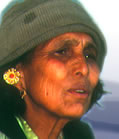THEMES IN THIS
TESTIMONY
Conflict

Environment

Festivals

Spiritual Beliefs

Click on arrows
to find more
testimonies
featuring
these themes
|
|
Sex
|
female
|
|
|
Age
|
74
|
|
|
Identity
|
Tamang
|
|
|
Occupation
|
farmer
|
|
|
Location
|
Kavre district
|
|
|
Date
|
2002
|
|
summary
Soma, as she is known, is 74 and has witnessed many changes in her lifetime, most of which she feels have been for the better. It is only fear of the Maoists which casts a shadow over her life now. She gives quite a lot of detail on customs and everyday activities of the past. Although during her childhood she “only” had to collect fodder and cook food, at 19 she married into a poor family and had to work extremely hard. For 20 years she and other women (including the widows of her husband’s two brothers) used to collect firewood at night to sell in the morning in the nearest town. “We used to chop firewood all night in the forest. We set out carrying loads of firewood, set off at four in the morning, walked in the darkness carrying firewood to sell at Bhadgaon…” They used to have to scare away the forest guard, who would otherwise “loot” their firewood: “Then we, the elders, start brandishing sticks and shouting for help once we have surrounded the forest guard. Then everyone would run helter skelter, everyone would start running away. Even the forest guard would run away…” Her account of this gives some indication of how people’s poverty forced deforestation on a major scale – she talks of “60 to 70” people doing the same as her each night.
From this account, and from her descriptions of defying her husband and going to festivals, the reader gets the impression of a bold and spirited woman who can stand up for herself. On the other hand, the words “we suffered” are like a refrain throughout the testimony, and when she recalls how their desperate poverty and how hard their life was she says, “It makes me want to cry, thinking of all that.”
Unlike some narrators she has only praise for the new farming methods and inputs: “Now there are huge harvests of maize, wheat, paddy and mustard… It has become easier to sustain ourselves since that foreign fertiliser came.” She says people can get anything they want nowadays, but adds, “Without money you will get nothing to eat.” She is critical of young people: “They simply loiter around. If you scold them, they quarrel with us… They have no interest in working in the fields these days. They don’t do anything. If you ask them to bring fodder, they refuse. If you ask them to bring firewood, they will not…” Her main complaint, though, is that the presence of Maoist rebels in the area has brought fear into their lives. They are afraid to go into the forest, to travel to festivals, or even to open their doors at night. Otherwise, “life is good”. “It’s so easy now… If you have the money, you can buy everything right here in the village. It’s only the Maoists and some other things that trouble us.”
detailed breakdown
|
You will need a password from Panos to view the full
transcript of the interview. To apply for a password, click here.
Once you have a password, click here to go to the beginning
of the transcript. You can also click on any section of the
breakdown of content below and go straight to the
corresponding part of the transcript.
|
| Section Section 1-2 |
Personal details. Husband’s sight not good, but has glasses supplied by VDC.
At night chopping down firewood in the forest, then carrying it to nearest town to sell: “some of us didn’t have rice in our house [and] no salt, so what else could we do but sell firewood for money?” Scaring away the forest guard.
Did this every night/morning for 20 years since getting married: “We have suffered so much. I had to carry firewood from the day I arrived.”
Earlier life at parents’ home was easier - collected fodder and cooked meals. Had 14 buffaloes.
|
| Section 3 |
“Mother-in-law wasn’t there… The father-in-law expired within a year of my arrival and each of us had to shoulder our burdens on our own.”
Widows of husband’s brothers both lived with them (the women collected firewood together). They are dead now. “I am the one unable to die.”
Says even now she’s “Not afraid of anyone…I used to beat the forest guard…I will not spare anyone who is abusive…”
Son, daughter-in-law and 2 daughters died. 3 daughters live elsewhere, one daughter still at home. “See this youngest one… I have to die at her feet.”
|
| Section Section 4-6 |
Although life is better now, says there has been massive rise in cost of living.
Changes in clothes worn – used to have very coarse cloth, now wear synthetics.
Fear of Maoists. Before: “You could merrily go around singing. There was nothing to fear even if you walked through the forest all night… Now, it is frightening…. As soon as night falls, one is afraid to step out of the door.”
Going with friends to festivals. No longer goes because of fear of Maoists.
|
| Section Section 6-8 |
Husband didn’t like her singing at festivals, used to beat her but she still went.
“Maybe it’s because he thinks I will elope with another man, he keeps telling me not to sing. Now, will one elope because one sings?”
Nowadays the young have “so many comforts”.
Changes in diet. Once only had rice at festivals and queued all day to get it. With irrigation (piped water) people can grow vegetables.
“Now you get everything here. If you have money…”
Chemical fertilisers have had major impact on production: “Now there are huge harvests of maize, wheat, paddy and mustard.”
|
| Section Section 9-10 |
Says children steal money nowadays and are lazy. Electricity has brought TV and all they want to do is watch it, which corrupts them: “now this plagues us.”
Says Maoists don’t come to village because people will beat them up.
Erratic electricity supply. Mentions again the huge difficulty in getting “rice, salt and kerosene” in the past; when they could afford it, had to queue for hours.
|
|


